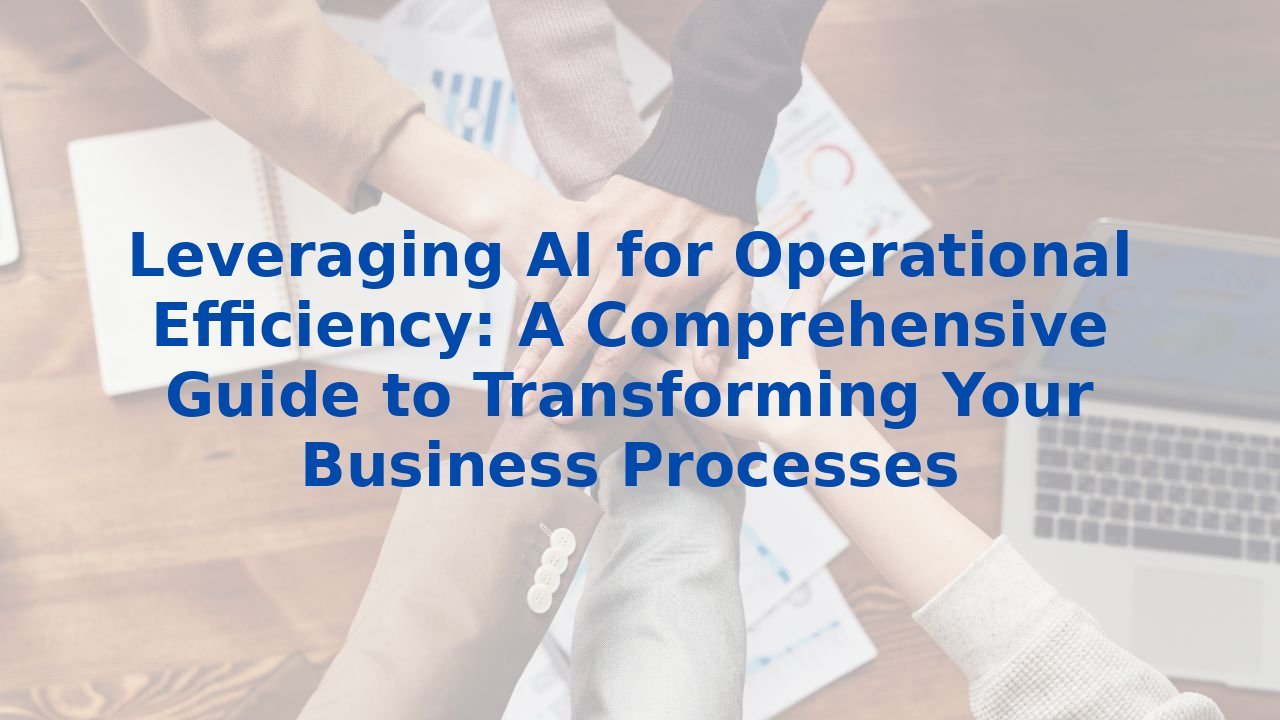Leveraging AI for Operational Efficiency: A Comprehensive Guide to Transforming Your Business Processes
Leveraging AI for Operational Efficiency: A Comprehensive Guide
Introduction
In a world where time is money, businesses must continuously seek ways to enhance operational efficiency to remain competitive. Artificial Intelligence (AI) has surfaced as a transformative force, enabling organizations to optimize their operations and foster growth. This guide delves into the various business processes that can be enhanced with AI, offering a roadmap toward a more efficient and productive future.
What is AI for Operational Efficiency?
AI for operational efficiency encompasses the use of advanced technologies like machine learning and automation to refine and enhance business processes. By automating repetitive tasks and augmenting decision-making capabilities, organizations can shift human resources toward strategic initiatives that foster innovation and creativity.
Key Areas Where AI Enhances Operational Efficiency
1. Automated Workflows
Data Entry and Report Generation: One of the most tedious yet essential tasks in business is data entry. AI excels at automating this through accurate, rapid processing, allowing staff to prioritize higher-level activities like strategic planning.
Exception Handling: When issues arise, AI alleviates routine responsibilities, enabling teams to focus on solving complex problems and enhancing overall efficiency.
Customer Service Excellence: By automating basic customer interactions, AI allows personnel to devote more time to personalized service, improving customer satisfaction and loyalty.
2. Predictive Maintenance
Sensor Data Analysis: AI can analyze performance data from embedded sensors in machinery to monitor their health continuously.
Anomaly Detection: Advanced algorithms identify deviations in machinery operation, foreseeing issues before they escalate into costly downtimes.
Actionable Alerts: Proactive maintenance strategies informed by AI insights can minimize disruptions, keeping production lines running smoothly.
3. Data Analysis and Predictive Analytics
AI-driven Data Analysis: The ability to digest vast amounts of data rapidly empowers organizations to uncover hidden trends and patterns that facilitate informed decision-making.
Forecasting Capabilities: With AI-guided predictive analytics, companies can optimize inventory management and refine pricing strategies, aligning operations more closely with market demands.
4. Customer Support and Service
AI Chatbots: Chatbots provide swift responses to customer inquiries, enhancing service quality and freeing human agents to focus on complex issues.
Natural Language Processing (NLP): NLP technologies analyze customer feedback and social media interactions to identify sentiment, helping tailor marketing efforts more effectively.
Benefits of AI for Operational Efficiency
1. Enhanced Productivity
With AI tackling repetitive tasks, the workforce can channel its efforts toward more critical projects. This shift can lead to significant improvements in productivity. In sectors like software development, for instance, AI can generate test data, allowing developers to focus on creating more innovative solutions.
2. Accelerated Speed of Business
The ability to process real-time data provides organizations with the edge to respond swiftly to issues, preventing potential breakdowns and minimizing maintenance costs.
3. Quality and Precision
AI reduces human error and strengthens adherence to quality standards. Its continuous learning capabilities allow organizations to improve workflows and achieve superior outcomes over time.
4. Optimized Talent Management
AI plays a pivotal role in streamlining recruitment processes, tackling bias, and enhancing talent sourcing. By automating candidate screening and identification, businesses streamline their hiring while fostering a more productive workforce.
The Importance of Training Employees for AI
While the integration of AI technologies comes with numerous advantages, realizing these benefits hinges on effective employee training. Here’s why it’s essential:
1. Understanding AI Capabilities
Equipping employees with the knowledge of AI capabilities enhances their ability to integrate these technologies into their workflows effectively.
2. Promoting Collaboration
Training fosters a collaborative environment where employees work symbiotically with AI systems, ensuring optimal outcomes from both human and machine efforts.
3. Adapting to Change
As AI reshapes workflows, training prepares employees for the shifts in processes, empowering them to navigate these changes smoothly.
4. Cultivating a Culture of Continuous Learning
In a rapidly evolving business landscape, ongoing training is vital to stay ahead. An organization invested in skill development will reap the long-term benefits of a workforce prepared for future challenges.
Conclusion
The power of AI can redefine operational efficiency in ways previously unimagined. From automating workflows to improving customer interactions, AI transforms the business landscape, paving the way for enhanced productivity, cost savings, and reduced errors. Coupled with a commitment to employee training, organizations can fully leverage AI, unlocking unprecedented levels of efficiency and innovation. As businesses embrace these advanced technologies, the potential for sustained growth and competitiveness is boundless.



